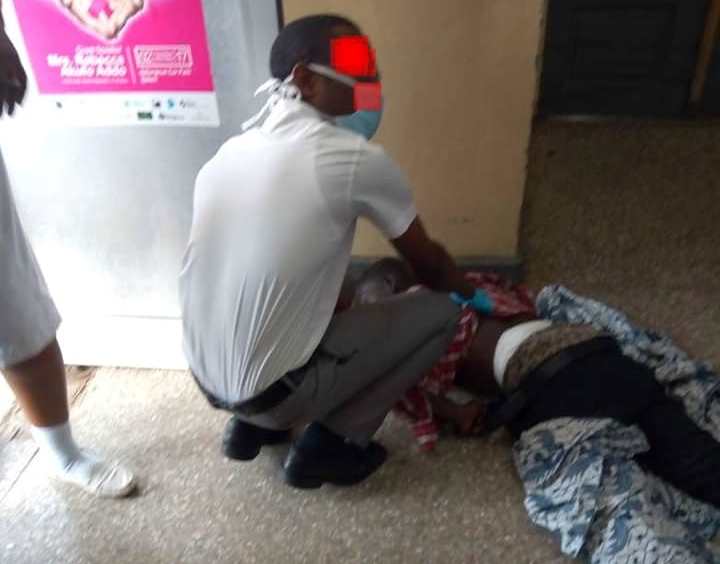 The Africa Centre for Health Policy (ACeHP), has said Ghana’s healthcare system is currently in an inhumane state.
The Africa Centre for Health Policy (ACeHP), has said Ghana’s healthcare system is currently in an inhumane state.
The Centre, in a comprehensive statement responding to the reports of patients receiving emergency care at Korle Bu on the floor and in chairs, said these practices were adding to the healthcare challenges.
The Africa Centre for Health Policy (ACeHP) is embarrassed by the state of Ghana’s health care system as evidenced by the wide circulation of pictures with patients on plastic chairs, trolleys, mats, mattresses, wheelchairs and bare floors connected to drip stands for treatment which contravenes standard medical practice, protocols and procedures set by the World Health Organization (WHO) of which Ghana is a signatory to and should adhere to these protocols.
“This inhumane practice has unacceptably been in existence for a long time and breeds incidence of nosocomial infections. The nosocomial infections impoverishes the patients as they have to bear the catastrophic cost of treating new infection(s) in addition to what they initially presented to the facility.”
“They have to spend additional monies and days to treat these new infections and this will put pressure on the amenities, patients and the health workers. Those unacceptable working conditions affects the physique and entire health state of the health personnel posing danger to both patients and physicians,” the centre explained.
Find below the full statement
Ghana’s Emergency Healthcare Crisis: Steps Urgently Needed to Significantly Reform the Comatose Health System, ACeHP’s Open Letter to Government of Ghana
The Africa Centre for Health Policy (ACeHP) is embarrassed by the state of Ghana’s health care system as evidenced by the wide circulation of pictures with patients on plastic chairs, trolleys, mats, mattresses, wheelchairs and bare floors connected to drip stands for treatment which contravenes standard medical practice, protocols and procedures set by the World Health Organization (WHO) of which Ghana is a signatory to and should adhere to these protocols.
This inhumane practice has unacceptably been in existence for a long time and breeds incidence of nosocomial infections. The nosocomial infections impoverishes the patients as they have to bear the catastrophic cost of treating new infection(s) in addition to what they initially presented to the facility. They have to spend additional monies and days to treat these new infections and this will put pressure on the amenities, patients and the health workers. Those unacceptable working conditions affects the physique and entire health state of the health personnel posing danger to both patients and physicians.
According to WHO 2016, Ghana’s life expectancy at birth is 62yrs and in the same year the World Bank reported under-5 mortality rate at 58.8. Ghana needs to spend more to improve its health indicators. Recent happenings at Korle-Bu and other health facilities in the capital have exposed Ghana’s health system as uneducative, confused, weak, comatose and reactive. Ghana has been performing poorly recently on health care delivery especially emergency medical care.
The Minister of Health on July 11, 2018 in a knee-jerk reaction directed the general public not to visit Korle-Bu with headaches and stomach upsets. This is a clear indication of a health system that does not educate consumers on what they should do or where to visit depending on their conditions.
It is not surprising Ghana has been labelled as a high medical risk country according to the 2018 Health Risk Map by International SOS.
ACeHP seeks to catalogue the challenges confronting Ghana’s health care delivery system presently and particularly in the areas of emergency medical care and infrastructure. Our decision to focus on the two aforementioned areas are as a result of:
- Governments’ systematic refusal to invest in Emergency Medical Care.
The Ghana Medical Association in one of its communiqués has indicated that government has not invested in emergency medical care for the past 15 years. Ghana is investing 3.6percent of its GDP in health services delivery as compared to other countries in Africa like South Africa and Sierra Leone who are investing 8.8 and 11.1 percent respectively. Any serious country should not spend less than 5percent of its GDP on health and high income countries even spend more than 10 percent of their GDP on health. This lack of investment into health has resulted in poor infrastructure, frail emergency medical care system and incapacitated staff to deal with emergencies. These have to be fixed quickly and immediately.
Government has the responsibility to ensure and provide coverage, quality, accessible and safe health care. The Korle-Bu Teaching Hospital and other facilities across the country have been overstretched and overwhelmed due to the lack of investment in our emergency medical system. This therefore endangers the intermediary goals of the health systems building blocks i.e. access, quality, coverage and safety.
- No bed syndrome that has befallen the nation.
The lack of planning as a country has resulted in the now famous no-bed-syndrome. Health services over the years have not been planned to meet the needs of the growing population. The recommended bed/patient ratio is 30/1000. Ghana currently has a bed/patient ratio of 0.9/1000. This means we have 9 beds for every 10,000 of the population instead of 300 beds to every 10,000 of the population. There is a clear deficit of 291 beds per every 10,000 of the population. The no-bed-syndrome song being sung by health workers is therefore a genuine song. Duty-bearers in whose hands this country has been entrusted into have let this country down. They get the best of treatment with personal doctors; seek care outside the country with no sense of responsibility to build a resilient health system in this country. The tax payers’ money that is used to build health facilities are either abandoned or left non-operational. This has apparently put pressure on the existing operational ones which is affecting quality and safe health care delivery. Patients are being turned away to die and those that get accommodated also don’t get the best of care. The general outcomes are disabilities or deaths.
- Ambulance mismatch.
The nation is grappling with a paltry 55 ambulances to a overwhelming population of over 29million individuals. From 155 ambulances to now 55 is an indication of lack of planning, preventive maintenance and lack of priorities as a country. Why should we sit down to reach this crisis level by allowing 100 ambulances to break down?
It’s worthy of note that those available aren’t well equipped to handle emergencies. The 55 available ambulances are grappling with lack of fuel, no first aid materials and consumables, etc. Most patients become dead on arrival because the ambulances transporting these patients don’t have the needed resources and are helpless to give life support while transporting people to the health facilities. Kofi Bentil of IMANI Ghana described this lack of priority in this way “Ghana has 4000 cars for presidential use and 55 ambulances for the rest of the population. One word: MAD!
- Doctor/Nurse/patient ratio
As at 2014, the doctor to patient ratio was 0.1/1000 or 1:10,000 against the recommended 1:5000 by the Commonwealth or 1:1320 by the WHO. The nurse/patient ratio was 1:1251 below the standard of 1:1000. These statistics show an inadequate supply of our health personnel. The few available can’t man up to the tasks and the pressures at work. A doctor who attends to more than 200 people a day cannot give quality care. Poor quality healthcare is costly; it leads to loss of lives, loss of time, loss of public confidence, low staff morale and also results in wastage of our limited resources. In the midst of this, Ghana still has a back-lock of unposted nurses, doctors and other health professionals sitting at home after they have be trained with the tax payers’ money. This is a significant contributory factor to the current quagmire we find ourselves in.
- Low GOG budgetary allocation and spending on health care.
Currently, the government spends less than 5% on healthcare. Our percentage of GDP expended on health is woefully inadequate. Fiscal space has been limited and tighter. Government’s idea to cap the health budget and IGF of health facilities is crippling health delivery. Facilities aren’t able to finance themselves adequately when NHIA delays in reimbursing them. The NHIS is not working effectively and efficiently. The indigents, children under 18, the aged constitute about 62% of subscribers. These groups do not pay premiums and this make the scheme too generous. There is funding gap and this has contributed to the over delay in reimbursing claims. Most facilities in the country are collapsing and are not able to pay casual workers or buy basic consumables.
- Unstable electricity supply to facilities.
Much recently, there have been wide reports of health facilities that aren’t able to attend to patients due to lack of stable electricity. A typical example is the case of the Akrodie Health Centre in the Asunafo North Municipality of the Brong Ahafo Region where nurses are forced to use mobile phone torchlight to deliver pregnant women due to power off and lack of a standby generator. Patients keep dying on operation beds and labor beds. This is unacceptable. These patients pay taxes to the state but can’t get the snowball utility benefit of their taxes. Electricity is a key pillar to the health system. We must make electricity available at all cost to the health facilities for the purposes of quality health care delivery.
- Lack of robust public health system
Ghana currently is bedevilled with double disease burden; communicable and non-communicable diseases. This amidst donor fatigue is suffocating the health system. A strong, decentralized public health system has not been established and as a country we prefer to pay for treating people to preventing diseases from arising in the first place. The NHIS pays for curative services and because there is no monetary return for engaging in public health activities, health managers are compelled to focus on activities that generate funds. This has led to the insidious establishment of hypertension, diabetes, cancers and other non-communicable diseases which are more difficult to manage.
ACeHP’s Proposed Temporary Solutions
- Government must as a matter of urgency, procure gazebos for emergency purposes. All emergency cases passing through the OPD that needs detention or admission must go to the Gazebo for care after basic attention has been given to them at the OPD. When stabilized at the gazebos, then those that need in-ward admission based on their condition would be admitted in the wards. These gazebos are easily procured and mounted for emergencies. The stakeholders in our health industry must accept that we are in a crisis situation to warrant this solution. Medical equipment for a gazebo setup can be procured in Ghana here than import again which takes weeks and less of red-tapeism. Whilst at it, government must increase in health sector-specific resources especially funds through earmarked revenues. More of the resources must be pumped into our emergency health sector.
- The government should do a recall of capable retired personnel for marshal action. We should fall back on them for the time being because the current stock of health personnel are inadequate. Those that would gladly come back to serve for the short time we propose should be given state honours’ in the form of awards including appetizing remuneration packages. We must fall on these gifted hands.
- We also ask the government to mobilize and deploy some of its mobile clinic vans to the national capital to help serve as a similitude of ambulances for the time being after which they would be sent back to their original stations. Most of them are not engaged regularly as they are used for scheduled outreach programs. These same mobile clinic vans are deployed to communities that have CHPS compounds that serve almost same purposes.
- We also implore the government to use our contingency fund at this critical moment to save the nation from these preventable disabilities, deaths and further international embarrassment resulting from congestion. If there’s a time to utilize the contingency fund, now is the time.
- Strengthen existing services. Government through the MOH and GHS must upscale our CHPS and empower the Community Health Officers to provide primordial and primary health care to communities to reduce the burden on the bigger facilities with minor conditions.
Permanent solutions
- Government should make proportionate and well equipped ambulances available
- Government should increase health spending from the 3.6 of GDP to above 5% of GDP and strategically invest in the health sector.
- Government should strengthen management and raise standards
- The NHIA should incorporate preventive care in its list of services provided
- There should also be a robust inter-sectorial and ministerial collaboration between the ministry of health and the ministry responsible for sanitation. The current sanitation state of our environment is bizarre.
- Government should review its 70% capping policy of IGF from facilities to allow some leeway for health facilities to deliver safe and quality health care. This however must be done through enhanced accountability and transparency.
- Government should get financial clearance for and employ all the back-lock of unemployed licensed health personnel to man the completed health facilities under lock and key. Recruitment should be based on staffing norms and must be strictly adhered to.
- Government must prioritize public health and spend more on population driven interventions that are community driven and accessible to all.
- We entreat government to prioritize training of emergency and peri-operative professionals and preventive healthcare services. Incentives should be provided for those interested in specializing in these critical areas.
- Government should as a matter of urgency, procure standby generators and solar panels for all health facilities across the country.
With the above enumerated challenges and accompanying solutions to our emergency healthcare sector, ACeHP wishes that government adopts these solutions for us to turn a new leaf and have a new life. In the advent of modern health care delivery, it’s not only worrying but dehumanizing for patients seeking care with their paltry incomes to be treated in such conditions.
We entreat our international donors i.e. KOICA, World Bank, UN-WHO/UNICEF, Global Fund, JICA, USAID, GAVI, et al. who are our development partners to also speak to these issues affecting our basic existence. We are asking these donors who invest hugely in our health sector not to sit and watch these practices go on.
In this age, why should a patient be asked to buy a plastic chair or mat to serve as a bed for medical care?
Signed:
Ahmed Farhan
Executive Director, ACeHP
Source: citinewsroom.com








